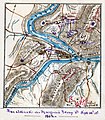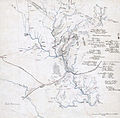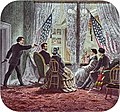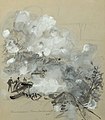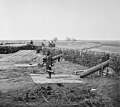Portal:American Civil War
 |
 |

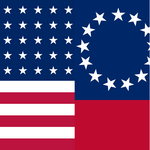
The American Civil War (1861–1865) was a sectional rebellion against the United States of America by the Confederate States, formed of eleven southern states' governments which moved to secede from the Union after the 1860 election of Abraham Lincoln as President of the United States. The Union's victory was eventually achieved by leveraging advantages in population, manufacturing and logistics and through a strategic naval blockade denying the Confederacy access to the world's markets.
In many ways, the conflict's central issues – the enslavement of African Americans, the role of constitutional federal government, and the rights of states – are still not completely resolved. Not surprisingly, the Confederate army's surrender at Appomattox on April 9,1865 did little to change many Americans' attitudes toward the potential powers of central government. The passage of the Thirteenth, Fourteenth and Fifteenth amendments to the Constitution in the years immediately following the war did not change the racial prejudice prevalent among Americans of the day; and the process of Reconstruction did not heal the deeply personal wounds inflicted by four brutal years of war and more than 970,000 casualties – 3 percent of the population, including approximately 560,000 deaths. As a result, controversies affected by the war's unresolved social, political, economic and racial tensions continue to shape contemporary American thought. The causes of the war, the reasons for the outcome, and even the name of the war itself are subjects of much discussion even today. (Full article)
The Battle of Malvern Hill, also known as the Battle of Poindexter's Farm, was fought on July 1, 1862, between the Confederate Army of Northern Virginia, led by Gen. Robert E. Lee, and the Union Army of the Potomac under Maj. Gen. George B. McClellan. It was the final battle of the Seven Days Battles during the American Civil War, taking place on a 130-foot (40 m) elevation of land known as Malvern Hill, near the Confederate capital of Richmond, Virginia and just one mile (1.6 km) from the James River. Including inactive reserves, more than fifty thousand soldiers from each side took part, using more than two hundred pieces of artillery and three warships.
The Seven Days Battles were the climax of the Peninsula Campaign, during which McClellan's Army of the Potomac sailed around the Confederate lines, landed at the tip of the Virginia Peninsula, southeast of Richmond, and struck inland towards the Confederate capital. Confederate general Joseph E. Johnston fended off McClellan's repeated attempts to take the city, slowing Union progress on the peninsula to a crawl. When Johnston was wounded, Lee took command and launched a series of counterattacks, collectively called the Seven Days Battles. These attacks culminated in the action on Malvern Hill. (Full article...)
Indiana, a state in the Midwest, played an important role in supporting the Union during the American Civil War. Despite anti-war activity within the state, and southern Indiana's ancestral ties to the South, Indiana was a strong supporter of the Union. Indiana contributed approximately 210,000 Union soldiers, sailors, and marines. Indiana's soldiers served in 308 military engagements during the war; the majority of them in the western theater, between the Mississippi River and the Appalachian Mountains. Indiana's war-related deaths reached 25,028 (7,243 from battle and 17,785 from disease). Its state government provided funds to purchase equipment, food, and supplies for troops in the field. Indiana, an agriculturally rich state containing the fifth-highest population in the Union, was critical to the North's success due to its geographical location, large population, and agricultural production. Indiana residents, also known as Hoosiers, supplied the Union with manpower for the war effort, a railroad network and access to the Ohio River and the Great Lakes, and agricultural products such as grain and livestock. The state experienced two minor raids by Confederate forces, and one major raid in 1863, which caused a brief panic in southern portions of the state and its capital city, Indianapolis.
Indiana experienced significant political strife during the war, especially after Governor Oliver P. Morton suppressed the Democratic-controlled state legislature, which had an anti-war (Copperhead) element. Major debates related to the issues of slavery and emancipation, military service for African Americans, and the draft, ensued. These led to violence. In 1863, after the state legislature failed to pass a budget and left the state without the authority to collect taxes, Governor Morton acted outside his state's constitutional authority to secure funding through federal and private loans to operate the state government and avert a financial crisis. (Full article...)

Neal Dow (March 20, 1804 – October 2, 1897) was an American Prohibition advocate and politician. Nicknamed the "Napoleon of Temperance" and the "Father of Prohibition", Dow was born to a Quaker family in Portland, Maine. From a young age, he believed alcohol to be the cause of many of society's problems and wanted to ban it through legislation. In 1850, Dow was elected president of the Maine Temperance Union, and the next year he was elected mayor of Portland. Soon after, largely due to Dow's efforts, the state legislature banned the sale and production of alcohol in what became known as the Maine law. Serving twice as mayor of Portland, Dow enforced the law with vigor and called for increasingly harsh penalties for violators. In 1855, his opponents rioted and he ordered the state militia to fire on the crowd. One man was killed and several wounded, and when public reaction to the violence turned against Dow, he chose not to seek reelection.
Dow was later elected to two terms in the Maine House of Representatives, but retired after a financial scandal. He joined the Union Army shortly after the outbreak of the American Civil War in 1861, eventually attaining the rank of brigadier general. He was wounded at the siege of Port Hudson and later captured. After being exchanged for another officer in 1864, Dow resigned from the military and devoted himself once more to prohibition. He spoke across the United States, Canada, and Great Britain in support of the cause. In 1880, Dow headed the Prohibition Party ticket for President of the United States. After losing the election, he continued to write and speak on behalf of the prohibition movement for the rest of his life until his death in Portland at the age of 93. (Full article...)
- ... that the only functioning secondary school in Mississippi during the American Civil War was founded by Thomas S. Gathright?
- ... that at the Battle of La Haye-du-Puits in July 1944, a Confederate flag dating to the American Civil War was raised over the town?
- ... that Colonel Bradley Winslow was brevetted by US president Abraham Lincoln for "brave and gallant conduct" during the siege of Petersburg in the American Civil War?
- ... that Enoch Marvin Banks resigned from the University of Florida because of public outrage over his belief that the American Civil War was caused by slavery?
- ... that Francis Orray Ticknor was a country doctor whose fame as a poet relies on "Little Giffen", a poem about one of his patients who died in the American Civil War?
- ... that in the aftermath of the American Civil War, the only Black-led organization providing teachers to formerly enslaved people was the African Civilization Society?
- Attention needed
- ...to referencing and citation • ...to coverage and accuracy • ...to structure • ...to grammar • ...to supporting materials
- Popular pages
- Full list
- Cleanup needed
- The West Tennessee Raids
- Requested articles
- James Ashby (soldier) • Benjamin D. Fearing • James B. Speers • Charles S. Steedman • Battle of Barton's Station • Lawrence P. Graham • Frederick S. Sturmbaugh • Davis Tillson • Action at Nineveh (currently a redirect) • International response to the American Civil War • Spain and the American Civil War • Savannah Campaign Confederate order of battle • Native Americans in the American Civil War (currently disambiguation after deletion) • Battle of Lafayette • Battle of Sunshine Church • Requested American Civil War Medal of Honor recipients
- Expansion needed
- Battle of Boonsborough • Battle of Guard Hill • Battle of Rice's Station • Battle of Simmon's Bluff • Battle of Summit Point • Charleston Arsenal • Edenton Bell Battery • First Battle of Dalton • Blackshear Prison • Edwin Forbes • Hiram B. Granbury • Henry Thomas Harrison • Louis Hébert (colonel) • Benjamin G. Humphreys • Maynard Carbine • Hezekiah G. Spruill • Smith carbine • Edward C. Walthall • Confederate States Secretary of the Navy • Confederate States Secretary of the Treasury • David Henry Williams • Battle of Rome Cross Roads • Delaware in the American Civil War • Ironclad Board • United States Military Railroad • Kansas in the American Civil War • Rufus Daggett • Ebenezer Magoffin • Confederate Quartermaster-General's Department • First Corps, Army of Northern Virginia • Francis Laurens Vinton • Henry Maury • Smith's Expedition to Tupelo • Other American Civil War battle stubs • Other American Civil War stubs
- Images needed
- Battle of Lone Jack • Preston Pond, Jr. • Melancthon Smith
- Merging needed
- 1st Regiment New York Mounted Rifles and 7th Regiment New York Volunteer Cavalry
- Citations needed
- 1st Alabama Cavalry Regiment (Union) • 4th Maine Battery • 33rd Ohio Infantry • 110th New York Volunteer Infantry • Battle of Hatcher's Run • Camp Dennison • Confederate colonies • CSS Resolute • Dakota War of 1862 • Florida in the American Civil War • Ethan A. Hitchcock (general) • Fort Harker (Alabama) • Gettysburg (1993 film) • Iowa in the American Civil War • Second Battle of Fort Sumter • Samuel Benton
- Translation needed
- Add an article here!
The following Wikimedia Foundation sister projects provide more on this subject:
-
Commons
Free media repository -
Wikibooks
Free textbooks and manuals -
Wikidata
Free knowledge base -
Wikinews
Free-content news -
Wikiquote
Collection of quotations -
Wikisource
Free-content library -
Wikiversity
Free learning tools -
Wikivoyage
Free travel guide -
Wiktionary
Dictionary and thesaurus
- Shortcuts to this page: Portal:ACW • P:ACW










